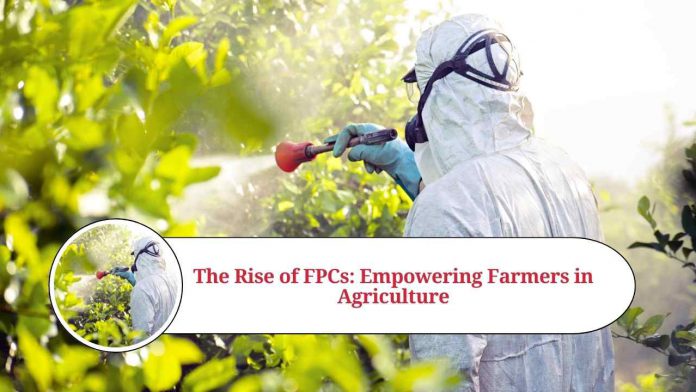In recent years, Farmer Producer Companies (FPCs) have emerged as a powerful tool to transform the agriculture sector in India. FPCs are essentially farmer-owned and -operated companies that aim to improve the economic prospects of small and marginal farmers by pooling their resources and leveraging collective bargaining power. In this blog, we’ll delve into the concept of FPCs and their impact on agriculture.
What are FPCs?
FPCs are registered under the Companies Act, 2013 and are managed by a board of directors elected by the farmers. They are essentially a group of farmers who come together to form a company with the aim of improving their income and livelihoods. FPCs can engage in a wide range of activities, including procurement, production, marketing, and processing of agricultural products.
The government of India has been actively promoting FPCs as a means to empower small and marginal farmers. In 2018, the Ministry of Agriculture and Farmers’ Welfare launched a scheme called “Formation and Promotion of Farmer Producer Organizations (FPOs)” with an allocation of Rs. 4,496 crore. The scheme aims to promote 10,000 FPOs over a period of five years.
Benefits of FPCs
FPCs offer several benefits to small and marginal farmers. By pooling their resources and leveraging collective bargaining power, farmers can get better prices for their produce. FPCs can also provide access to credit, inputs, and technology, which can help farmers increase their productivity and income.
Moreover, FPCs can play a crucial role in reducing post-harvest losses by providing better storage facilities and processing infrastructure. By adding value to their produce through processing and branding, farmers can command a higher price for their products.
Impact of FPCs on agriculture
FPCs have the potential to transform the agriculture sector in India by making it more inclusive and sustainable. By empowering small and marginal farmers, FPCs can reduce the income disparities between farmers and create a more equitable distribution of wealth. They can also help in the development of rural areas by creating employment opportunities and boosting local economies.
Moreover, FPCs can promote sustainable agricultural practices by providing access to technology and inputs that reduce the use of chemical fertilizers and pesticides. By promoting organic farming and sustainable agriculture, FPCs can also help in reducing the impact of agriculture on the environment.
Conclusion
FPCs have emerged as a powerful tool to empower small and marginal farmers in India. By pooling their resources and leveraging collective bargaining power, farmers can get better prices for their produce and access to credit, inputs, and technology. FPCs can also play a crucial role in reducing post-harvest losses and promoting sustainable agriculture. With the government’s support, FPCs have the potential to transform the agriculture sector and create a more equitable and sustainable future for farmers.
Read More Useful Content:
- Top Benefits of E-Invoicing Software For Your Business
- Best e-Invoicing Software to Simplify Your GST e-Invoicing
- E-invoicing – Guide On E-Invoicing System In India
Frequently Asked Questions (FAQs)
Q. What is an FPC?
A: FPC stands for Farmer Producer Company, which is a type of company registered under the Companies Act, 2013 and owned and operated by farmers. FPCs aim to improve the economic prospects of small and marginal farmers by pooling their resources and leveraging collective bargaining power.
Q. How do FPCs work?
A: FPCs are formed by a group of farmers who come together to form a company with the aim of improving their income and livelihoods. The FPC is managed by a board of directors elected by the farmers. FPCs can engage in a wide range of activities, including procurement, production, marketing, and processing of agricultural products.
Q. What are the benefits of FPCs?
A: FPCs offer several benefits to small and marginal farmers, including better prices for their produce, access to credit, inputs, and technology, reduction in post-harvest losses, and the promotion of sustainable agricultural practices. By adding value to their produce through processing and branding, farmers can command a higher price for their products.
Q. How are FPCs different from traditional farmer cooperatives?
A: FPCs are a type of farmer cooperative, but they differ from traditional cooperatives in that they are registered under the Companies Act, 2013 and are managed by a board of directors elected by the farmers. FPCs can engage in a wider range of activities and have greater flexibility in their operations compared to traditional cooperatives.
Q. Are there any government schemes to support FPCs?
A: Yes, the government of India has launched a scheme called “Formation and Promotion of Farmer Producer Organizations (FPOs)” to promote the formation of FPCs. The scheme aims to promote 10,000 FPOs over a period of five years and provides financial support for the formation and capacity building of FPCs.
Q. How can farmers form an FPC?
A: Farmers can form an FPC by registering under the Companies Act, 2013 and fulfilling the eligibility criteria set by the government. The FPC should have a minimum of 10 members and a maximum of 2000 members, and at least two-thirds of the members should be farmers. The FPC should have a minimum capital of Rs. 5 lakhs, and the farmers should hold at least 50% of the shares in the FPC.
Q. Can FPCs access government schemes and subsidies?
A: Yes, FPCs can access government schemes and subsidies related to agriculture, such as subsidies on inputs, credit, and insurance. The government also provides financial support for the formation and capacity building of FPCs under various schemes.




















